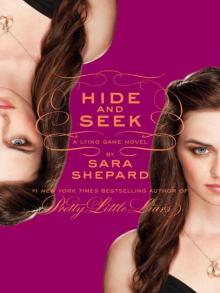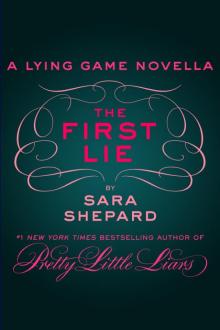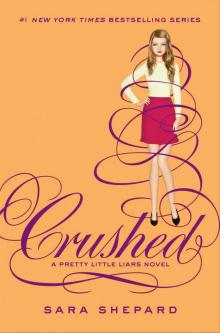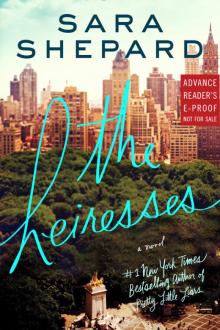- Home
- Shepard, Sara
The Heiresses Page 3
The Heiresses Read online
Page 3
And then there was Clarissa, Aster’s rail-thin best friend and maybe frenemy, daughter of a hedge fund billionaire. Aster had met Clarissa at Spence in second grade, yet Clarissa still spoke with an affected British accent. She was always up for getting in trouble—or making trouble. Aster suspected that some of the blind items on Page Six about her were tips from Clarissa.
The waiter reappeared with their champagne, and Aster held her glass out for a refill. “Cheers!” she exclaimed as she clinked glasses with Clarissa, then downed it all in a single swig.
They were at a restaurant called Badawi, which had been carved out of an old warehouse in the West Twenties and transformed into high souk glamour. It was decorated to look like a bazaar in Morocco, with hanging lanterns and brightly colored tents and couches. Crowded little tables bearing hookah pipes lined the perimeter, and there was a jam-packed dance floor at the back, where a DJ with short pink hair played techno music. The air smelled of turmeric, cardamom, and roasted lamb. Aster had started out the night at SoHo House, but half the tables had been empty, the music was all from last year, and several guests looked like they’d come straight from New Jersey. After consulting Instagram and Foursquare and texting a few of her model friends, she and her entourage had arrived here.
Aster’s nights often took on this spontaneous spirit; she couldn’t predict at the beginning of the evening where she’d be at the end. It had been this way since the summer she’d spent in Europe, right after high school. She had some great stories for the memoir she’d write—well, dictate—someday: the time she and her rotating posse piled into a private plane and flew to Ibiza; the time they pooled their cash to buy a Porsche Carerra and drove to someone’s upstate chalet at 2:00 a.m.; the time she stayed in a mansion in Harlem for a week and partied like people in the Jazz Age. Once she flew a friend’s twin-prop plane around his Connecticut airfield on a dare, even though her last lesson had been years ago. She’d water-skied naked on an ice-cold lake in Maine, and mountain-biked down dangerous trails in Sedona. Recently, someone had even dared her to chop off her signature long, white-blond hair. Aster had turned to her friend Patrick, a stylist, and handed him the scissors. He’d cut it all off, leaving the front at an exaggerated, crooked angle over her left eye—Aster never knew whether that was on purpose or a drunken mistake, but she’d become infatuated with it. The press loved the new look as much as her father hated it.
For Aster, every thrill needed to be more thrilling, every high higher, and every song louder and more danceable. A psychoanalyst might suggest that she had daddy issues or was doing this for attention—or perhaps that she was running away from someone. But Aster never went to therapy. She thought it was complete bullshit. She wasn’t a sad girl who self-medicated by drinking too much and staying out too late; she was a daredevil who’d have lots of interesting stories for her grandchildren. Growing up, Aster and Corinne’s parents had forced them to memorize poetry; the ones that made sense to Aster were by free-spirited women poets from the 1920s. She was a huge fan of Edna St. Vincent Millay, who allegedly loved to party and tended to her lush blueberry farm in upstate New York totally in the nude. My candle burns at both ends; / it will not last the night; / but ah, my foes, and oh, my friends— / it gives a lovely light! Hellz yeah, Edna St. Vincent Millay.
Mr. No-Knickers Waiter reappeared with several lit sparklers and a bottle of Gray Goose l’Orange. Aster joined in everyone’s squeals of excitement as she reached for a sparkler, waving it in the air as some R&B artist crooned over the speakers.
She reached for her phone, seized with the desire to invite more people out. The first person who came to mind was her cousin Poppy. It rang once, then her cousin’s sleepy voice broke through.
“Pops!” Aster called out over the noise of the club. “What are you doing right now?”
“I’m home.” Poppy yawned. “What are you doing?”
Aster held out her champagne flute for a refill. “I’m out. Will you come? Please?”
When they were growing up, Aster prided herself on not trying too hard to be like Poppy, like her sister Corinne always did. Poppy was her friend—like a cool big sister who didn’t give Aster shit about her choices. Well, most of the time. She had given Aster a pretty harsh talking-to after Aster confessed she’d seduced her European history teacher at NYU for a better grade, then dropped out of college all together. But Poppy pried because she cared.
“Ugh, I’m beat.” Poppy sighed through the phone. “I’m in back-to-back meetings for the rest of the decade, Briony’s been up every night this week, and I’m losing my mind planning this birthday party for Skylar. I’m such a buzz kill. But why don’t you call your sister? Maybe she’d like to come.”
Aster burst out laughing. “You were there today, Poppy. She’s probably not going to speak to me ever again.”
She rolled her eyes, recalling Corinne’s gown fitting that morning. Who scheduled a fitting at 9:30 on a Saturday, anyway? She had woken up with a start, remembering the three messages her sister had left her the day before, and wriggled out from underneath Nigel’s arm. She hadn’t even taken the time to shower or explain where she was going, instead just throwing on her clothes and sprinting out of her apartment with her shoes only half on. Only in the cab did she realize she still smelled like the tequila shots from the night before.
At least the rain might help with that, Aster had thought wryly as she raced down Lhullier’s block under the shitty umbrella she’d bought from a bodega on the corner. But when she walked into the salon, she’d seen the look on her sister’s face. Corinne wasn’t happy that Aster was there, or worried at all about her soaked appearance. She just wrinkled her nose in that way she always did, as if she smelled something bad. As if Aster had ruined everything.
Poppy heaved a sigh. “I think she just had an idea of how she wanted things to go, honey. And you sort of threw a wrench into that.”
“Well, she’s got to learn that sometimes life throws you wrenches,” Aster shot back, crossing her arms over her chest.
“You should try to see things her way,” Poppy said quietly.
Aster scoffed. “What about her seeing things my way? Has she ever done that?” Aster already knew the answer: No. Corinne didn’t like things she couldn’t understand. And she had never understood Aster.
Poppy yawned. “I’m sorry I’m so old and lame. Do you want to grab a drink later this week?”
Aster cradled the phone, touched. Even when Poppy was up to her eyeballs in work and family duties, she always made time for Aster. Even in the aftermath of Poppy’s parents’ death in that freakish plane crash two years ago, Poppy had come to brunch with Aster for her birthday just days later. She was always so . . . solid. Unflappable. “Of course,” Aster said. “Just let me know when you’re free.”
She hung up and took another swig of champagne, then another. She was feeling warm and distinctly fuzzy at the edges; she’d drained almost the whole bottle. She hiccupped loudly, watching as her friends stood to dance. “Are you coming?” Nigel asked, extending his hand. He had a beguiling, gap-toothed smile.
Aster closed her eyes for a moment, imagining what it would be like to fall into her thousand-thread-count bed—alone. To sleep for a full eight hours, get up at a normal hour, go for a jog, stand in line for coffee. Actually make one of Corinne’s bridal activities tomorrow—surely there was one scheduled—instead of whirling in horribly late, only to be kicked out. Kicked out, she thought angrily, by her own fucking sister. What Corinne didn’t know was that Aster had protected her all these years. She’d preserved Corinne’s perfect little view of their family. Oh, there’d been plenty of times when Aster had almost blurted out what she knew, but something inside her had held back, knowing it would shatter her sister even more than it had shattered her. And what did Aster get in thanks? Rejection.
She grabbed the Veuve
and drank it straight from the bottle, hoping to silence the thoughts that flitted around her mind like sharp little birds. All at once, she wanted to black out—to drink so much she forgot herself, forgot everything except the dance floor and the sound of the music. She held out her hand to Nigel, and he pulled her to her feet.
The crowd on the dance floor parted for them, left them space in the middle of the room. “You forgot your drink,” Clarissa yelled over the sound of the music, pressing another glass into her hand, and Aster downed it without realizing what it was. Then she closed her eyes and raised her slender arms over her head, letting all the grimy memories and barbed comments from today wash down the drain. The only thing that mattered right now was having fun.
My candle burns at both ends, it will not last the night, Aster thought defiantly as she swayed slowly to the beat. Aster didn’t believe in the curse, but she did know that if another Saybrook died young, she’d be the one. Her reckless, feckless lifestyle was a ticking time bomb. Deep down, she worried she wasn’t long for this world.
But maybe that was okay, Aster thought, stumbling forward into Nigel’s arms. She’d rather be the quick-burning firecracker than a slow-to-die ember. Everyone knew it was more fun to go out with a bang than with a whimper.
UNCORRECTED E-PROOF—NOT FOR SALE
HarperCollinsPublishers
....................................
3
On Sunday afternoon, Rowan Saybrook sat in the corner of a living room in the Dakota on Central Park West and watched twelve princesses meet and greet one another. Each was adorned in a taffeta ball gown, crystal slippers, and a tiara. They plucked hors d’oeuvres from a silver tray with grace and poise.
But then Jasmine stepped on Ariel’s foot. Aurora raised an eyebrow at Sofia the First, declaring that she wasn’t as real a princess because the Disney cartoon had only started a few years ago. Rowan, sensing disaster, tiptoed out of the room and into her cousin Poppy’s kitchen, reaching for a bottle of cabernet. It was Poppy’s daughter Skylar’s third birthday, and it was probably best to let the little princesses work things out for themselves.
The kitchen was large and airy, with new marble countertops and Brazilian cherry cabinets. Poppy, dressed in a gauzy batik-print silk popover and skinny pants that made her legs look a million miles long, stood at the island, arranging the tray of chopped-up locally grown vegetables she’d bought at the Union Square Farmer’s Market, her twenty-month-old, Briony, balanced on her hip. She noticed Rowan pouring the wine. “The kids driving you to drink, huh?”
“I’ve never really understood the whole princess thing,” Rowan said, recorking the wine.
“Of course you don’t,” Rowan’s mother, Leona, said good-naturedly, smiling at her daughter from across the kitchen. “This one was all about climbing the highest trees in our backyard when she was Skylar’s age. And sometimes falling out of them.”
Aunt Penelope paused from making a plate of food for her husband, Mason, the CEO of Saybrook’s, and laughed. “You could climb higher than most of the boys, Rowan. I still remember when you beat your brother at the ropes course; he sulked for days.”
Corinne, who had been leaning against the counter, sidled over to Rowan and eyed the wine bottle. “Can you pour me a glass? I need to destress after my week.”
“I heard about Turkey,” Rowan said. “Congratulations.” Then she lowered her voice. “I also heard what happened with Aster.”
Corinne’s eyes narrowed to slits. “Yeah, well. I guess we shouldn’t be surprised.” She peered around the room, probably searching for her sister, who’d been here a few moments ago but was now absent. “She’s probably passed out in Poppy’s bed right now,” she spat angrily.
“Don’t worry—I’ll make sure she’s on time to the wedding.” Evan said, taking a break from directing the housekeeper’s cleanup efforts. She hated messes, especially kid messes. “Believe me when I say I’ve dealt with worse.”
“Worse than the Saybrooks?” muttered Natasha from her perch near the pantry.
“Natasha!” Natasha’s mother, Aunt Candace, snapped from the corner, where she was helping Poppy with more of the hors d’oeuvres.
Rowan glanced at Natasha cautiously. Not so long ago, she and Natasha had been so close. Rowan was nearly ten years older than Natasha, but she’d happily played bit parts in Natasha’s one-act plays and cheered when Natasha put on karaoke concerts on the back porch at Meriweather. But after Natasha disinherited herself from the family—never explaining why—she treated Rowan and the others like irritating pedestrians taking up the whole sidewalk on a crowded block on Fifth Avenue.
Rowan knew her cousins felt the same way she did. Except Poppy, who’d begun to mend fences with Natasha a few years ago, after her parents died. But perhaps that was because Aunt Candace and Uncle Patrick had served as Poppy’s surrogate family after the plane crash, smothering her, James, and their girls with love, help, and baked goods for months.
Luckily everyone ignored Natasha’s comment, even the perfectly groomed moms Poppy knew from Episcopal, where Skylar attended preschool. To Rowan, those poised Manhattan mothers with their matching Bugaboo strollers were a different species. They compared notes on organic cloth diaper vendors, bragged about sleep training, and rated their friends’ live-in nannies. But as judgmental as they were of each other, they seemed to judge nonmothers most of all. “Jealousy assuaged by superiority,” Poppy always said. “They envy your free time, so they pretend you’re selfish for not having kids to feel better about playing patty-cake all day long.”
And that was the beauty of Poppy. She had the Bugaboo stroller and made her own organic baby food, but she’d never behaved as though motherhood was a special, exclusive club.
“What’s going on, ladies?” Poppy’s husband James appeared in the doorway, dressed in a vintage T-shirt and well-cut jeans that, when he raised his arms, revealed just a half inch of his Brooks Brothers boxers. He swept across the room and pulled Poppy into a hug.
Poppy wriggled away and turned toward the fridge. “Did you get the hummus from Zabar’s?” she asked briskly. “I can’t find it anywhere.”
“Right here.” James reached in and produced a container.
“Perfect.” Poppy grabbed it from him and placed it on the table, next to the veggies.
“Thanks, James,” Rowan called out, when Poppy didn’t.
James gave the moms an exaggerated bow and an irresistible grin. “Just doing my job.” Then he grabbed his wife once more and kissed her cheek. Poppy squirmed away again, and James disappeared to the den. A whistle bleated from the flat-screen TV. James, Mason, and a few other fathers were back there watching the Djokovic-Federer French Open match.
A mother named Starla, her infant Baby-Björned to her torso, sighed. “Poppy, he’s such a doll.”
“How do you keep other women away?” another woman named Amelia teased.
“Oh, he wears an ankle bracelet so I can keep track of him,” Poppy said absently.
“Poppy has it all,” said Amelia, a little unkindly. “And we all kind of hate her.” She tapped a manicured nail against the window. A biathlon was taking place in Central Park, and hundreds of runners thundered past toward the finish line. “Do you know what Bethany said when we came in?” she murmured, changing the subject. “ ‘Mommy, can I be in the bisexual next year?’ I was like, ‘Don’t you mean biathlon?’ But she said, ‘No, I want to be in the bisexual!’ ”
Poppy smirked. “Skylar said ‘douchebag’ to the doorman.”
Darcy, a blond mother, shifted her weight. She had Pilates-perfect balance even in her five-inch heels. “My daughter’s favorite word is prick.” Then she looked at Rowan. “What about yours?”
“Oh, um—”
Before Rowan could answer, Poppy clutched her arm. “Rowan is the best aunt in the world,” she
said in a loud voice.
“Thanks,” Natasha said sardonically.
“Tied for best aunt,” Poppy corrected herself with a smile, squeezing Rowan tighter. “And she’s Saybrook’s senior counsel. She was first in her class at Columbia Law.”
Rowan suddenly felt too tall and too visible, all elbows and angles. Poppy meant well, but boasting about what Rowan was seemed to highlight what she wasn’t: a mother.
Fumbling to change the topic, Rowan turned toward Natasha. “So . . . how’s the studio?” she asked clumsily. After Natasha decided she no longer wanted to be a Saybrook, she’d reinvented herself and lived a quiet life in Brooklyn, running a yoga studio for the borough’s bourgeois.
“It’s great, thanks,” Natasha said, lowering her long lashes. She was darker than the other Saybrook girls, with olive skin, sleek, dark hair, and almond-shaped eyes. “How are things going with . . . Charlie, is it?”

 The Lying Game #4: Hide and Seek
The Lying Game #4: Hide and Seek The Lying Game #5: Cross My Heart, Hope to Die
The Lying Game #5: Cross My Heart, Hope to Die 9780062240149 First Lie
9780062240149 First Lie Pretty Little Liars #13: Crushed
Pretty Little Liars #13: Crushed The Heiresses
The Heiresses